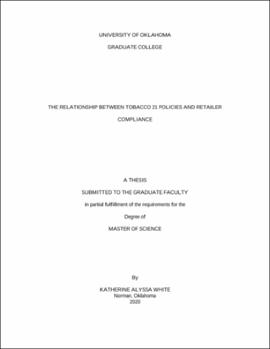| dc.description.abstract | Introduction: Tobacco 21 policies raise the minimum legal sales age for tobacco in the United States, but in order for the policies to be effective, they must be observed by retailers. This study evaluated the relationship between local Tobacco 21 policies and retailer compliance across the United States.
Methods: Local policies included in this study (n = 271) were retrieved online through searches for local ordinances, municipal codes, or through the local clerk of each policy location. Municipality size was obtained from the United States Census, which was combined with retailer compliance data (violations, inspections, type of product sold during violations) from the FDA Compliance Check database. Violation rates before and after policy implementation were examined.
Results: Significant differences were found between groups’ violation rates after policy implementation and population size (F[5,248] = 3.97, p = 0.002). Violation rates for locations with a population between 5,001-10,000 (M = 0.03, SD = 0.05) were significantly different from both locations with 50,001-150,000 people (M = 0.08, SD = 0.07, p = 0.029) and those with 150,001 or more people (M = 0.11, SD = 0.08, p = 0.029). Policies without suspension (M = 0.09, SD = 0.08) had significantly higher violation rates after policy implementation than those with suspension (M = 0.05, SD = 0.06), (t(75.5) = 3.022, p = 0.003). Additionally, policies without revocation (M = 0.07, SD = 0.07) had significantly higher violation rates after policy implementation than those with revocation (M = 0.05, SD = 0.06), (t(180.26) = 2.12, p = 0.035). Significant differences were also found among the product types sold during violations after policy implementation.
Conclusions: Although the raise in sales age is beneficial, having the recommended policy components, such as both monetary penalty structures and suspension/revocation of tobacco retailer licenses, is important in the success of Tobacco 21 policies at decreasing sales to minors. | en_US |
